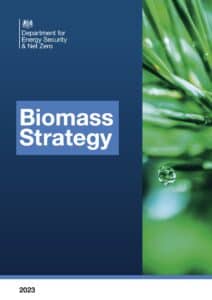 We are pleased to announce that today the Government published its Biomass Strategy, which presents the role biomass can play in reaching net zero, what Government is doing to enable that objective, and where further action is needed. Bioenergy experts have welcomed the strategy but say urgent action is now needed to transform its ambitions into deliverable policies. Professor Patricia Thornley (Aston University, Supergen Bioenergy Hub and member of the Biomass Connect Advisory Board) says:
We are pleased to announce that today the Government published its Biomass Strategy, which presents the role biomass can play in reaching net zero, what Government is doing to enable that objective, and where further action is needed. Bioenergy experts have welcomed the strategy but say urgent action is now needed to transform its ambitions into deliverable policies. Professor Patricia Thornley (Aston University, Supergen Bioenergy Hub and member of the Biomass Connect Advisory Board) says:
“This is a comprehensive and considered biomass strategy that, rightly, places sustainability at the heart of UK bioenergy development. The challenge is now to produce actions that can deliver the sustainable system of biomass required to achieve net zero.”
The Department for Energy Security and Net Zero says that the strategy reiterates the government’s firm commitment to biomass sustainability and considers how this resource could be prioritised strategically across the economy to help achieve the UK’s net zero target, saying that the Strategy includes:
- A commitment to develop and implement a cross-sector sustainability framework, subject to consultation;
- An assessment of future sustainable biomass supply to the UK including where further action may be needed to secure the necessary levels of supply;
- A priority use analysis for biomass which indicates biomass should be prioritised in applications where we can capture and store the CO2 that is emitted, which will deliver the negative emissions needed to support UK’s net zero goal; and
- The government’s view on the role of Bioenergy with Carbon Capture and Storage (BECCS), including principles and routes to deployment of BECCS.
Professor Iain Donnison (IBERS and Biomass Connect project management team) commented:
“We welcome the new Biomass Strategy and its focus on the prioritisation of using biomass in those applications most suited to helping the UK reach net zero. Also, given the public concern about the sustainable sourcing of biomass, it is important that the strategy has covered the need for robust criteria for monitoring, verification and reporting of biomass supplies whether they are produced domestically or imported.”
Speaking specifically about biomass crop planting Professor Donnison continued:
“The UK’s Climate Change Committee recommended that approximately 750,000 hectares of perennial biomass crops, such as Short Rotation Coppice (SRC) willow and Miscanthus, should be planted in the UK by 2050 and that this could be achieved without any impact on food production. Current planting rates are less than 1,000 hectares per year, so there is clearly much to do.”
Commenting on the next steps, Professor Donnison added:
“Farmers and land managers have been understandably reluctant to commit to the upfront costs of planting perennial biomass crops, particularly given the uncertainty over subsidies and grants for alternatives such as tree planting. These crops offer many of the same advantages as trees, and so national governments have an opportunity to support farmers to grow them in order to meet the legally binding net zero targets as well underpinning the rural economy.”
“The UK has relatively small areas of high-grade agricultural land and it’s important that we continue to produce food on this land. However, land with lower margins is well suited to perennial biomass crops. These crops have wider benefits, including biodiversity, soil carbon sequestration and flood resilience, in addition to providing feedstocks for energy and green manufacturing. So, a scaling up of biomass can help support both rural and urban economies.”
The new strategy outlines the role of biomass in the UK’s transition to net zero, with sustainability as a major theme and will shape the biomass industry for years to come.
You can read the full policy document here: UK Biomass Strategy 2023.



